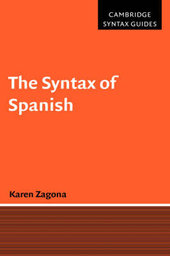
|
The Syntax of Spanish
Hardback
Main Details
| Title |
The Syntax of Spanish
|
| Authors and Contributors |
By (author) Karen Zagona
|
| Series | Cambridge Syntax Guides |
|---|
| Physical Properties |
| Format:Hardback | | Pages:300 | | Dimensions(mm): Height 229,Width 152 |
|
| Category/Genre | Grammar and syntax |
|---|
| ISBN/Barcode |
9780521571777
|
| Classifications | Dewey:465 |
|---|
| Audience | | Professional & Vocational | | Tertiary Education (US: College) | |
|---|
|
Publishing Details |
| Publisher |
Cambridge University Press
|
| Imprint |
Cambridge University Press
|
| Publication Date |
3 January 2002 |
| Publication Country |
United Kingdom
|
Description
Clear and well-organised, this textbook is an introduction to Spanish syntax, which assumes no prior knowledge of current theory. Beginning with a descriptive overview of the major characteristics of the grammar, it goes on to describe facts about Spanish, such as its word order, notions of 'subject', 'direct object', 'auxiliary verb' and so on. The book combines traditional grammatical description with perspectives gained from recent research in the Principles and Parameters framework. It also presents useful theoretical notions such as semantic roles, Case, and Predication. Accessibly written, the book gives just enough background so as to allow the reader to understand the lines of investigation that have been pursued in accounting for such issues as clause structure and constituent order. It will be of use to students who are interested in grammar, Spanish, or in some of the basic results of modern, formal linguistic theory.
Author Biography
Karen Zagona is Associate Professor of Linguistics and adjunct Associate Professor of Spanish at the University of Washington. She is author of Verb Phrase Syntax: A Parametric Study of English and Spanish (1988), editor of Grammatical Theory and Romance Languages (1995), and co-editor, with Ivonne Bordelois and Heles Contreras, of Generative Studies in Spanish Syntax (1986).
Reviews'... an impeccable introduction to the analysis of Spanish within the generative paradigm.' Bulletin of Spanish Studies
|